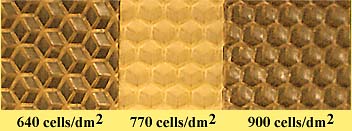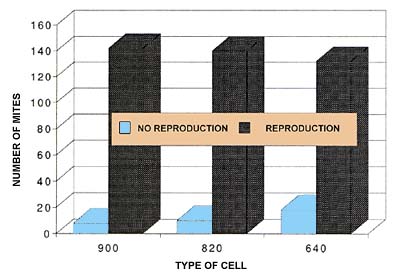

 |
The distribution between reproducing and non reproducing female Varroa mites in the different types of wax. |
| Distrubution of offspring | 640 cells/sq.dm | 770 cells/sq.dm | 900 cells/sq.dm | Total |
| Both female and male | 73 | 89 | 85 | 247 |
| Only female | 27 | 11 | 32 | 70 |
| Only male | 10 | 17 | 17 | 44 |
| Only protonymph | 22 | 23 | 8 | 53 |
| No offspring | 18 | 10 | 8 | 36 |
| Total | 150 | 150 | 150 | 450 |